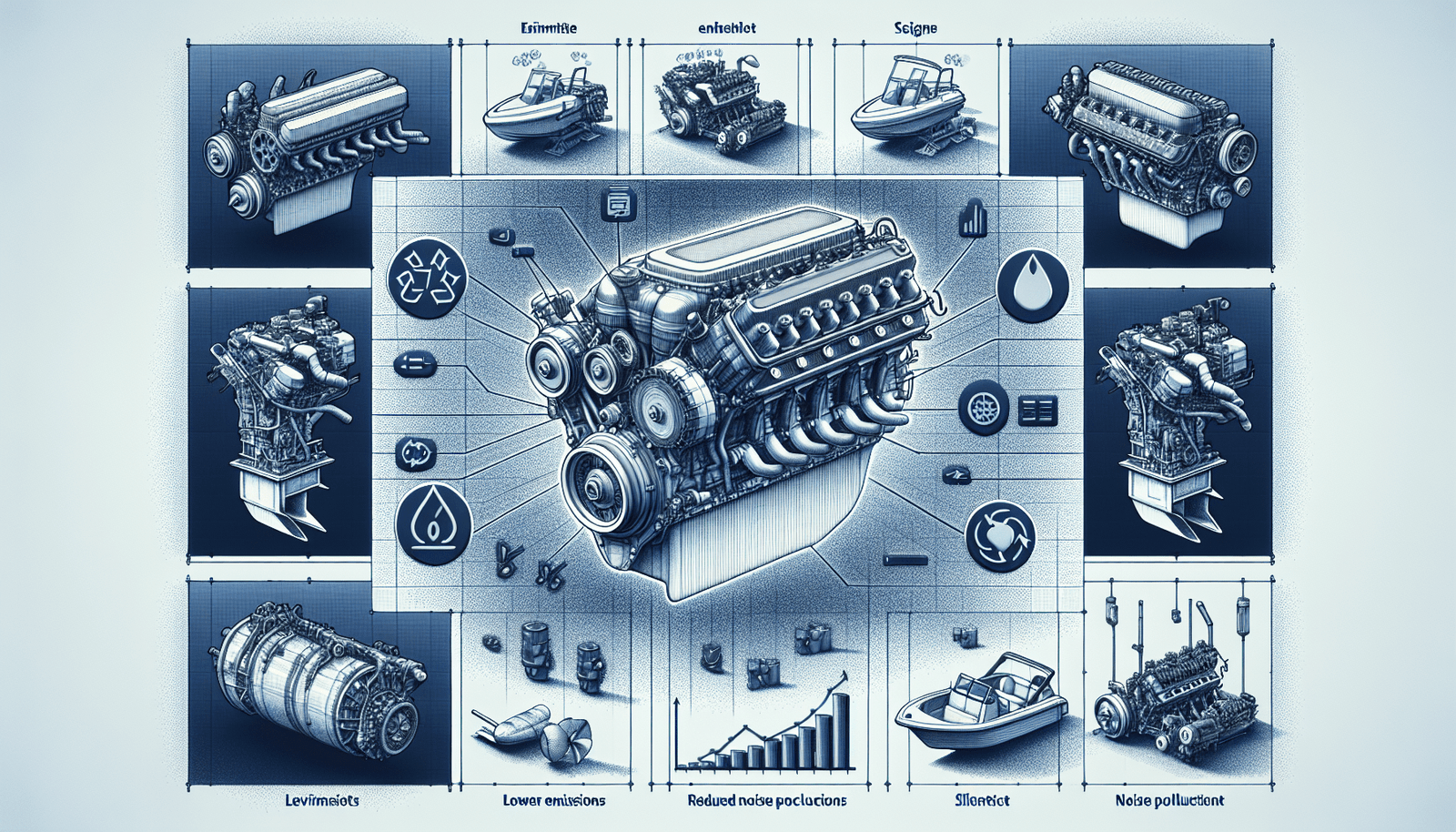Imagine you’re standing by the shore, the salty sea breeze tousling your hair and the sun setting on the vast blue canvas ahead. You can’t wait to set sail on your beloved boat — but then you remember the smoky odor and the brown, stain-filled water left behind by its engine. It’s time for a change — a shift towards sustainability. This article will guide you on how to choose an environmentally friendly boat engine; a choice that can significantly reduce your ecological footprint and ensure smoother, cleaner voyages ahead.
Understanding the Importance of Eco-Friendly Boat Engines
As a boat owner or someone considering boats as a hobby or lifestyle, it’s important for you to understand the impact your choices can have on our environment. Specifically, we’re talking about your boat engine – it might seem like a small part of a big picture, but the type of engine you choose has some serious ramifications.
Identifying the Impact of Traditional Boat Engines on the Environment
traditional boat engines, particularly those that run on petrol or diesel, contribute significantly to environmental pollution. These engines emit large quantities of carbon dioxide, carbon monoxide, hydrocarbons and other harmful pollutants while operating, directly affecting the air quality. In addition, engine leaks or spills lead to water pollution, posing threats to marine life and ecosystems.
The Role of Eco-Friendly Engines in Combating Pollution
This is where eco-friendly boat engines come in. These engines are designed with technology and materials that reduce the environmental impacts discussed earlier. Some engines run on electricity or hybrid technology, which cuts down on fossil fuel usage significantly. Other engines might use biofuel or biodiesel, which are derived from renewable sources and produce fewer emissions.
Benefits of Eco-Friendly Boat Engines for Marine Life
Beyond just reducing air and water pollution though, eco-friendly engines have a direct positive effect on marine life. The reduced noise pollution from these engines decreases stress on aquatic animals, and the lower levels of harmful emissions result in cleaner water and healthier animals and plants.
Defining Eco-Friendly Boat Engines
Now, you may be wondering what exactly qualifies as an eco-friendly boat engine. That’s a great question and one we’ll break down here.
Decoding the Parameters of an Eco-Friendly Engine
An eco-friendly engine is one that minimizes harm to the environment throughout its lifecycle. This includes manufacturing, usage, maintenance, and disposal. As such, eco-friendly engines are energy efficient, produce lower greenhouse gas emissions, and are made and discarded responsibly.
Difference between Traditional and Eco-Friendly Boat Engines
The main difference between traditional and eco-friendly engines is the fuel they use. While traditional engines run primarily on fossil fuels, eco-friendly engines use alternatives such as electricity, bio-diesel, and even solar energy. They are meticulously crafted to be more efficient, reducing fuel consumption and emissions.
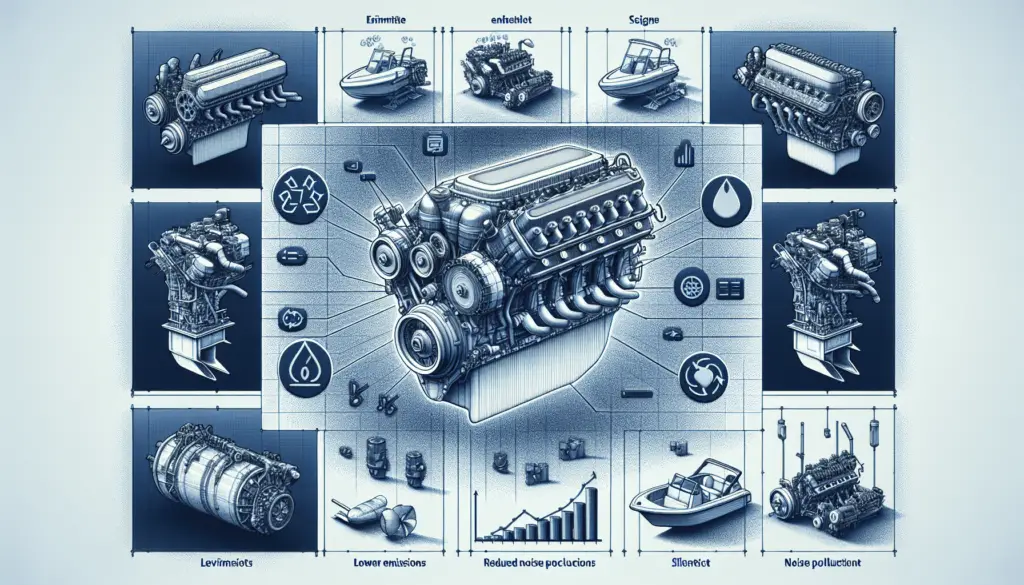
Explaining the Types of Eco-Friendly Boat Engines
There are several types of eco-friendly boat engines, each serving different needs while reducing environmental impact.
Electric Engines
Electric engines are among the most eco-friendly options for boat engines. They rely solely on electric power stored in batteries, eliminating the need for fossil fuels altogether.
Hybrid Propulsion Systems
Hybrid propulsion systems combine electric power with a traditional internal combustion engine. This allows you to switch between the two power sources depending on your needs, balancing performance with ecological responsibility.
Bio-diesel Engines
Bio-diesel engines operate much like traditional engines, but they run on bio-diesel fuel. This fuel comes from renewable sources like vegetable oils, animal fats, and recycled restaurant grease and produces fewer emissions than petrol or diesel.
Solar Powered Engines
Solar-powered engines harness the energy of the sun to power the boat. They are equipped with solar panels that collect sunlight and convert it into electricity. It’s a renewable and clean energy source that’s particularly practical for small boats and areas with abundant sunlight.
Analyzing Electric Boat Engines
There’s a lot to consider when it comes to electric boat engines.
Understanding the Methodology of Electric Engines
Electric boat engines consist of an electric motor and a battery bank. They work by converting electrical energy stored in the batteries into mechanical energy to turn the propellers.
Benefits and Limitations of Electric Engines
The biggest advantage of electric engines is their zero-emissions operation and significantly lower noise pollution. However, they do have limitations such as shorter range and longer refueling times compared to traditional engines, and they may not provide enough power for larger boats or certain water conditions.
Ideal Scenarios for Using Electric Engines
Electric engines are ideal for boating in protected waters such as lakes, rivers, and canals, especially when used for leisurely activities at slow to moderate speeds.
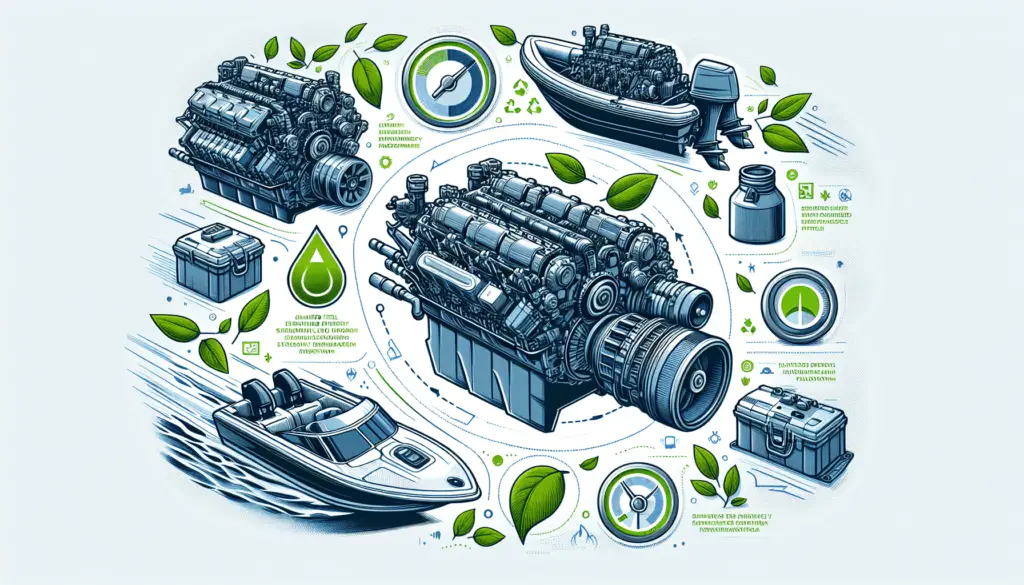
Delving into Hybrid Propulsion Systems
Hybrid propulsion systems offer flexibility by integrating renewable energy with conventional fuel.
Operational Aspects of Hybrid Engines
Hybrid engines combine an electric motor with a conventional combustion engine. This allows the boat owner to switch between the two power sources or to use both concurrently for a power boost when needed.
Pros and Cons of Using Hybrid Propulsion Systems
The main advantage of hybrid engines is that they offer the environmental benefits of electric power while providing the reliability, range, and power of traditional engines. However, they can be more complex and pricey than other engine types.
When to Opt for Hybrid Engines
Consider hybrid engines if you need a versatile solution that can switch between economical, quiet, and eco-friendly electric operation and powerful, long-range combustion engine operation.
Evaluating Bio-Diesel Engines
Are bio-diesel engines the right fit for your eco-friendly boat?
Understanding the Working of Bio-diesel Engines
Bio-diesel engines work much like conventional diesel engines, but they run on bio-diesel – a renewable and cleaner alternative to fossil fuels.
Advantages and Disadvantages of Bio-diesel Engines
Bio-diesel engines have the advantage of reducing emissions significantly. Moreover, bio-diesel is a biodegradable and non-toxic fuel. However, bio-diesel engines may require modification to regular diesel engines and may not perform as well in cold climates.
Criteria for Choosing Bio-diesel Engines
If you’re looking to make a smaller carbon footprint without sacrificing the convenience and performance of a traditional engine, a bio-diesel engine might be the right fit for you.
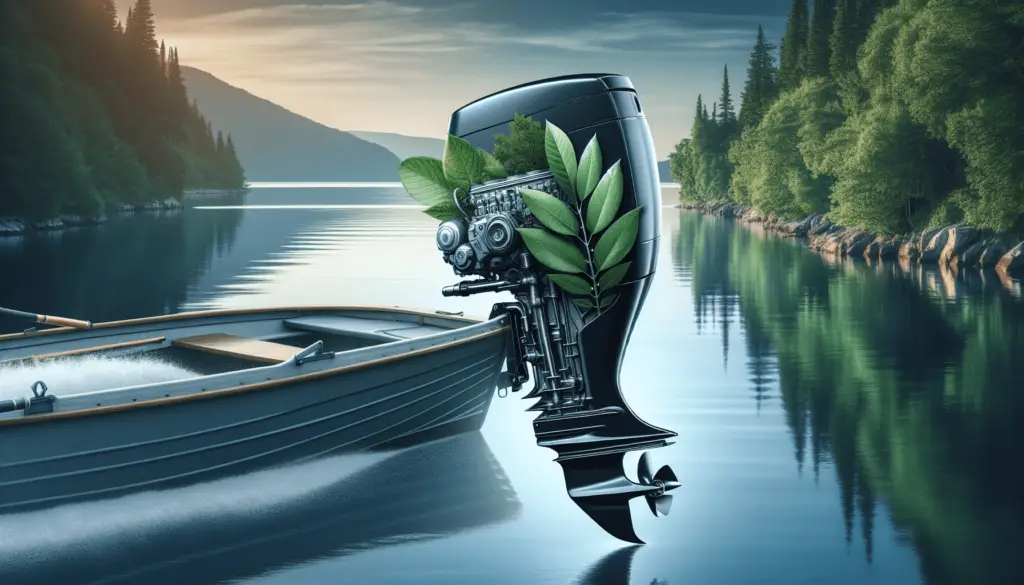
Assessing Solar Powered Boat Engines
Exploring the sunny side of boating with solar powered engines.
Mechanism of Solar Powered Engines
Solar-powered engines work by converting sunlight into electricity using solar panels mounted on the boat. This electricity powers the motor and is stored in batteries for use when the sun isn’t shining.
Benefits and Drawbacks of Solar Powered Engines
Solar engines have the advantage of being extraordinarily eco-friendly and cost-effective in regions with strong sunlight, as sunlight is a free and abundant renewable energy source. However, they are limited by weather and daylight conditions and may not be ideal for larger boats or high-speed activities.
Best Scenarios for Using Solar Engines
Solar-powered engines are best suited for light, leisure boating in regions with plenty of sunshine and calm waters.
Considering Your Boating Needs and Usage
To make the best choice for your eco-friendly boat engine, you need to consider how, where, and how often you’ll be using your boat.
Determining how often you’ll use the Boat
If you’re using your boat occasionally for leisure activities, a solar or electric engine could work well. Frequent, long-distance, or professional users may want to consider a hybrid or bio-diesel engine.
Understanding the Types of Water you’ll be in
Electric engines excel in calm, protected waters, while hybrids or bio-diesel engines are better suited for open-sea boating or rough water conditions.
Assessing Speed and Power Requirements
If speed and power are your top priorities, traditional or bio-diesel engines may better meet your needs. If you’d rather have a quiet, leisurely cruise, then an electric or solar engine is your bet.
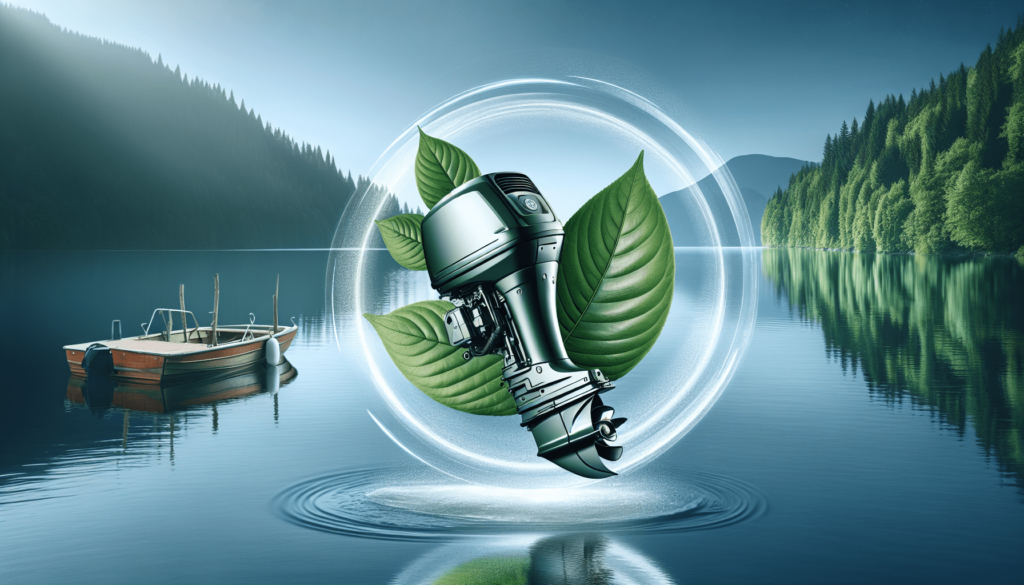
Understanding the Regulations & Certification for Eco-friendly Engines
Like every boat engine, eco-friendly engines must also meet certain regulations and certifications.
Importance of Compliance with Local and International Regulations
Boat engines are subject to environmental regulations governing emissions, noise levels, fuel types, and more. make sure your engine complies with the rules in your locality or any international waters you may cross.
Understanding Certifications for Eco-Friendly Boat Engines
There are certifications which signal that an engine meets certain environmental standards. Look for certifications like the EPA’s Clean Air Act Certification or the Blue Angel eco-label.
Maintenance and Sustainability
An essential part of having an eco-friendly engine is maintaining it properly and ensuring it is disposed of sustainably.
Understanding Maintenance Requirements for Different Types of Eco-Friendly Engines
Different engines have different maintenance needs. Electric and solar engines typically have fewer moving parts and therefore require less maintenance, while bio-diesel engines may need more frequent servicing.
Ensuring the Sustainable Disposal or Recycling of Engine Parts
When it’s time to replace or dispose of your engine, make sure it’s done in a way that minimizes environmental harm. Many parts can be recycled, and oils and fuels should be disposed of responsibly to avoid pollution.
In conclusion, choosing an eco-friendly boat engine goes a long way in preserving our environment. It’s a choice that aligns with our growing global consciousness towards reduction of carbon footprint and commitment to sustainable practices. Life on the water doesn’t have to come at a cost to the planet – not when there are so many great eco-friendly boat engine options to choose from. Your choice of engine, ultimately, is your vote for the kind of world you want to live in. Make it count!

